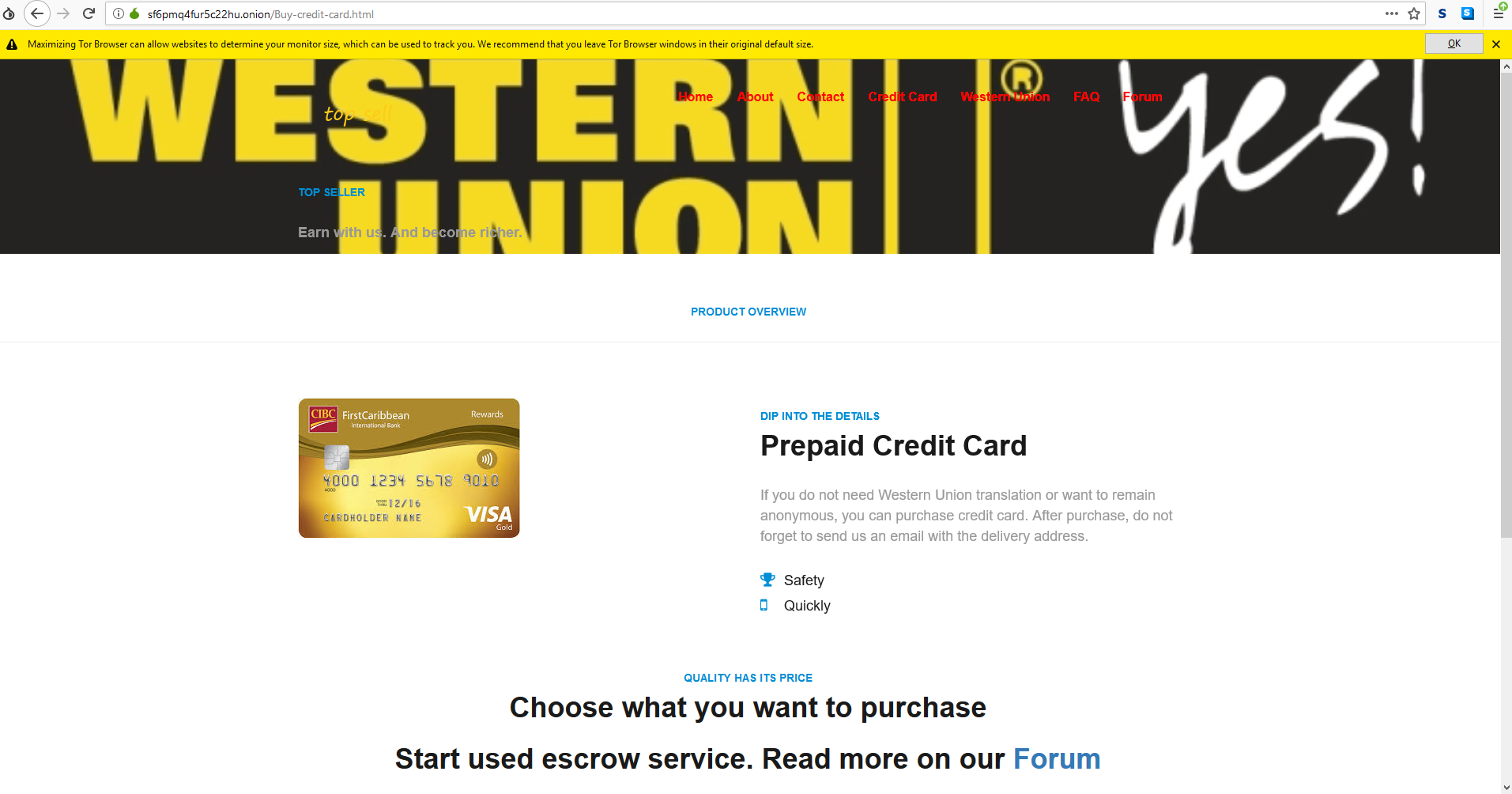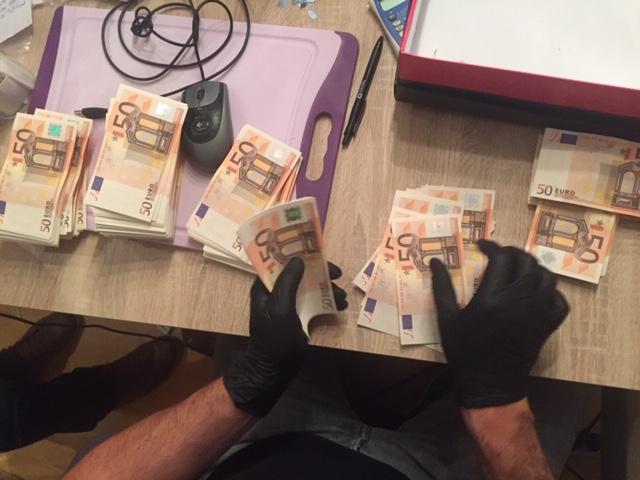Fraud
CIBC FirstCaribbean VISA Credit Cards sold on the darknet
General. @cibc @CIBC_FCIB credit cards being sold on the #TOR #darknet
http://sf6pmq4fur5c22hu.onion/Buy-credit-card.html
5CCs with $3,200 limit for $650 #Crime #Theft #Security #Cyber #CyberSecurity #Fraud #CreditCard #Bank #VISA
Operation Green Heart targets online currency counterfeit buyers
GeneralImage courtesy of Europol
A massive Europe wide operation took place between November 19 until December 6th, arresting 235 suspects in 13 countries. The operation confiscated 1,500 Euro banknotes, drugs, weapons, computers, phones, bitcoin, etc.
This operation was made possible after a 33-year old counterfeiter was arrested in June 2018 by Austrian police in the city of Leoben. The counterfeiter was producing 10,20 & 50 Euro banknotes and it is believed he had successfully offloaded over 10,000 (worth ~ $500,000 EUR) notes before being arrested. The counterfeit notes were sent out using regular mail, so as not to arouse suspicion.
The counterfeiter is believed to have designed the notes on his own computer. He printed them himself and made them look authentic using (suspected) Chinese made holograms. Depending on the quality of the prints, the price varied from 15-40% of the notes face value.
Aldia.cat also reports that data from an FBI/Europol raid on another Darknet seller specializing in weapons, drugs and fake money also contributed valuable information to Operation Green Heart.
The operation involved raids on 300 dwellings across Europe: 178 in Germany, 28 in France, 20 in Austria and others in Spain (Madrid, Velncia, Las Palmas de Gran Canaria, Tenerife, Barcelona, Sevilla, Granada, etc) , Croatia, Cyprus, Finland, Ireland and the Netherlands.
One of the suspects arrested in Munich still had 14 counterfeit notes with him.
The moral of the story is that good policing can cut through the anonymity of TOR, so criminals beware.
Sources:
EU-WIDE ACTION AGAINST BUYERS OF COUNTERFEIT MONEY ON THE DARKNET
Desmantellada una xarxa de distribució de bitllets falsos adquirits amb ‘bitcoins’
Vente de faux billets d'euros sur le darknet : arrestations à Montpellier et dans les P-O
Detenidas 18 personas, dos en CLM, por distribuir dinero falso adquirido en la darknet
Detingudes 18 persones per distribuir diners falsos adquirits a la 'darknet'
Don't fall victim to cyber crime this holiday season
technologyImage by Tex Texin used under Creative Commons License
The holidays are almost here and present a wonderful excuse to kick back and enjoy some great moments with family & friends. Too bad criminals never take time off and love the holiday period. Expect an increase in cyber-attacks against regular online netizens trying to shop for that perfect gift.
Expect cyber criminals to use their full arsenal of tools in an attempt to trick you into divulging your personal information (address, Date of birth, Social security number, banking, etc). Their favorite trick is the always popular (and very effective) phishing emails and phishing links on social media sites. They prepare convincingly well designed emails using brand names, super special prices, or incredible sounding promos to lure online shoppers into their dark net.
“If something looks too good to be true, it probably is.”
If something sounds too good to be true, it probably is. If you want to conduct any online transactions (banking, shopping, etc), go directly to the website in question and don't click through from an email.
Before handing over any personal information, make sure the site is using an encrypted SSL connection (little lock icon in the URL bar) and double click on it to ensure the provided certification information is correct.
Another trick scammers love to pull this time of the year is the old bat and switch. They advertise a name brand product (e.g. Bose QuietComfort 15) at an incredible must act now kind of price. When you receive the item it is either a Chinese fake knock-off masquerading as the product or is a cheap off name brand (Abidas instead of Adidas, Bosse instead of Bose, Beat instead of Beats, etc). Remember to only shop at name brand authorized online retailers (Amazon, Walmart, Target, J&R, B&H, etc).
I have seen dozens of customers get burned after buying gift cards from auction sites. You buy what you think is a valid gift card only to realize (when you try to use it) that the card is not activated or the credit has been completely used already.
Similar to the gift cards, be extremely careful when buying tickets to sporting events, concerts or shows. It is common for fraudsters to buy 1 pair and make (sell) multiple copies of it or in the worst case scenario, sell completely fake tickets.
Make sure all online transactions are paid for by credit card. These cards will give you some level of fraud protection. Be careful. You can complain to authorities if you are the victim of fraud but if you paid via paypal, western union, moneybooker, money mover, bitcount, postal money order, you will likely never see your money again.
7 rules of safe online shopping this holiday season
technologyCreative Common Image- Flickr User Don Hankins
The holiday season started with black Friday (in the US at least) and millions of people flock to online retailers hoping to snag a once-in-a-lifetime deal. Where there are hordes of people, there are criminals looking to take advantage of unsuspecting netizens.
So how can you stay safe? Here are some tips:
- Risky WIFI - Free WIFI may be tempting but I strongly recommend you stay away from them (unless you have a VPN solution) because someone may be sniffing your traffic looking for passwords or credit card information. It is recommended to do your shopping while in the safety of your home network.
- Don't click on that email link - Stores will be bombarding you with links to their special promo pages and criminals know this. They will often craft email attacks that look like they are coming from a reputable store but instead direct you (when you click) to their "evil" site. Type the retailers URL manually in your browser.
- Buy from trusted sites - In additional to creating fake Amazon like store-fronts, criminals sometimes set up entire fake online retailer storefronts complete with email marketing to SPAM lists they buy trying to lure you into giving them your credit card information. They do this by offering deals that are "too good to be true". If something is too good to be true it probably is. Only shop online from known and trusted retailers.
- Use strong passwords - This is a great time to make sure you are using long, complex and unique passwords. I recommend storing your passwords with a free tool called Lastpass (link). This is my preferred solution because it is online, secure, easy and free. I generate unique and strong passwords using a little known feature of Wolfram Alpha, instruction are provided here (link).
- Pay with plastic - Most credit cards have very consumer centric fraud protection limits therefore I recommend you make all of your online purchases with it (not debit cards which provide direct access to your bank account).
- Save purchase Information - Keep a record of all online purchases. This information will help you in the event of a fraud complaint or just to ensure the retailer treats you fairly. I recommend keeping:
- date - time
- exact model number, price and quantity
- exact copy of final invoice
- any shipping or tracking numbers
- customer support contact information
- Regularly Check your bank statement - This the season of fraud so it is a good idea to check your bank statement for irregularities at least once a week (until end of January).




